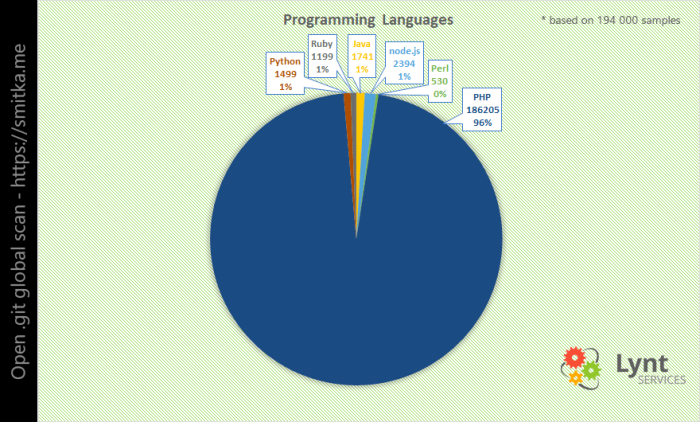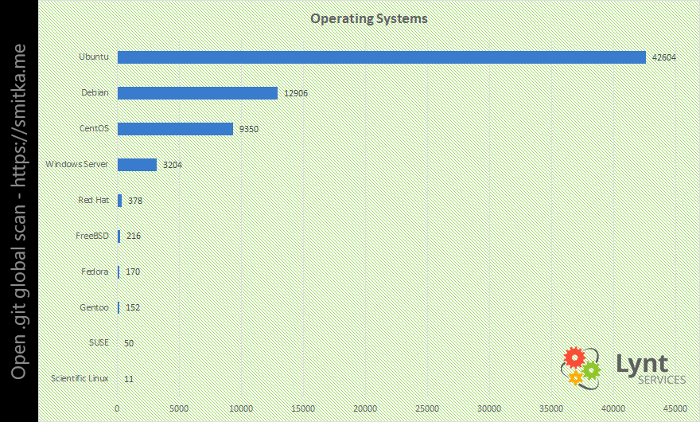390k. open folder .git websites
In July, security researcher Vladimir Smitka decided to check the Internet for open folders .gitafter a similar audit was recently conducted for the Internet domains of the Czech Republic and Slovakia.

As the saying goes: "there has never been such a thing, and here again." Let me remind you that 9 years ago, exactly the same story was with the Russian segment of the Internet affected by the open syndrome .svn. Below are the results of the hard work of the Czech researcher, tools and methods.
Causes of vulnerability
An attacker can learn a lot of information critical to the security of a site from a directory.git . This is a typical project tree.
├── HEAD
├── branches
├── config
├── description
├── hooks
│ ├── pre-commit.sample
│ ├── pre-push.sample
│ └── ...
├── info
│ └── exclude
├── objects
│ ├── info
│ └── pack
└── refs
├── heads
└── tagsIt can store passwords and access keys to various APIs, databases, and services rendered to the cloud.
Often, as it should be, an attempt to open a folder .gitgives an HTTP error 403, but the reason is only in the absence of the index.html / index.phprights and automatic indexing of the folder, while individual files are still available . In order to make sure that the site is not affected by vulnerability, you should open the page домен/.git/HEAD.
This file contains a link to the current project branch.
$ cat .git/HEAD
ref: refs/heads/masterEven if automatic indexing of directories is prohibited, you can easily restore the entire folder.git by downloading individual files and defining dependencies with a regular expression handler, due to the fact that the structure is .gitclearly defined. There is also a special tool - GitTools , which automatically performs all the necessary actions.
Means of production
Despite all the complexity and ambitiousness of the task, the cost in monetary terms was modest. For everything, everything went for $ 250.
Server
Smitka rented 18 VPS and 4 physical servers for the project. According to him, his choice did not fall on AWS for the reason that the full cost of the service, given the expected huge volumes of traffic, significant disk space and high CPU loads, did not lend itself to a simple calculation. The price of the rented VPS was fixed known in advance.
Domain List
The list is based on the text logs of the OpenData Rapid7 project in format JSON.
{
"$id": "https://opendata.rapid7.com/sonar.fdns_v2/",
"type": "object",
"definitions": {},
"$schema": "http://json-schema.org/draft-07/schema#",
"additionalProperties": false,
"properties": {
"timestamp": {
"$id": "/properties/timestamp",
"type": "string",
"description": "The time when this response was received in seconds since the epoch"
},
"name": {
"$id": "/properties/name",
"type": "string",
"description": "The record name"
},
"type": {
"$id": "/properties/type",
"type": "string",
"description": "The record type"
},
"value": {
"$id": "/properties/value",
"type": "string",
"description": "The response received for a record of the given name and type"
}
}
}After some filtering of TLDs and second-level domains, there were still over 230 million entries in the list .
Next, the database was divided into blocks of 2 million records and distributed the load across different servers using a PHP application.
Soft
The workhorse was performed by Python hung with asyncio asyncio libraries with aiohttp . The attempt to use Requests and Urllib3 for these purposes was not crowned with success, of which the first one might well fit, but the researcher did not understand the time-outs in the documentation. The second one didn’t cope with the redirection of domains and because of this, it rather quickly exhausted the memory on the servers.
To identify the platform, the profile of vulnerable sites, Smitka used the WAD utility based on the Wappalyzer database - an extension for a web browser that allows you to determine the technologies used on the page.
Also, simple command line utilities were used GNU Parallelsto speed up the execution time of the handler and prevent the script from stopping due to one hangup.
cat sites.txt | parallel --bar --tmpdir ./wad --files wad -u {} -f csvresults
Scanning lasted 2 weeks, as a result, the researcher:
- found 390 thousand vulnerable web sites;
- collected 290 thousand email addresses;
- notified 90 thousand recipients of the found vulnerability.
In response to his efforts, Smitka received:
- 18 thousand message delivery errors;
- about 2000 letters of appreciation;
- 30 false positives with honeypot systems;
- 1 threat to call the Canadian police;

PHP was the most popular programming language . However, if we normalize the result to the relative share of one or another PL, then PHP yields to Python and Node.js. However, it is unclear how reliable such statistics of determining the market share of a given programming language can be.
The list of web server popularity is headed by Apache , Nginx is in second place, and the Chinese Nginx Tengine clone suddenly ranked third.
The most popular OS turned out to be Ubuntu , then Debian, and CentOS in third place.

The CMS nomination almost turned out to be a one-man show, and this actor is WordPress with 85% of all the platforms found.
What's next
Fixing the vulnerability is easy.
.htaccess
RewriteRule"(^|/)\.(?!well-known\/)" - [F].nginx
location~ /\.(?!well-known\/) {
deny all;
}apache22.conf
<Directory ~ "/\.(?!well-known\/)">Order deny,allow
Deny from all</Directory>apache24.conf
<Directory ~ "/\.(?!well-known\/)">Requireall denied
</Directory>Caddyfile
status403 /blockdot
rewrite {
r /\.(?!well-known\/)
to /blockdot
}